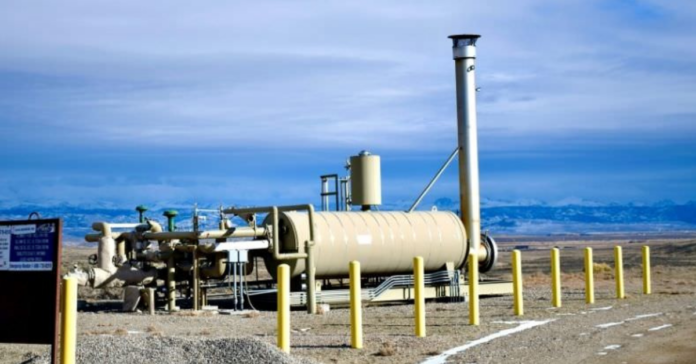The U.S. House of Representatives voted this morning to overturn a last-minute Obama administration rule targeting oil and natural gas development on federal lands. With today’s vote, the debate over the U.S. Bureau of Land Management (BLM) “venting and flaring” rule moves to the U.S. Senate.
The House passed a disapproval motion under the Congressional Review Act (CRA) in a 221-191 vote. Three Democrats – Collin Peterson of Minnesota, Jim Costa of California and Henry Cuellar of Texas – voted in favor of repealing the BLM rule.
In the lead up to the vote, the American Iron and Steel Institute (AISI), which represents the nation’s steel manufacturers, called for the BLM “venting and flaring” rule to be overturned. Montana Attorney General Tim Fox (R) – who is working with two other Western states to overturn the BLM rule in court – also endorsed the CRA measure ahead of the vote.
The BLM rule “would limit the production of domestic oil and natural gas, which would have negative effects on energy intensive industries, including steel manufacturers,” AISI president Thomas Gibson said in a Feb. 1 letter to lawmakers. The regulation, which targets methane emissions from oil and gas development on public and tribal lands, is “duplicative” because “states have already enacted laws requiring emissions reductions on oil and gas activities that address many of the objectives of the BLM rule,” Gibson said.
Fox, the Montana attorney general, said the BLM methane regulation oversteps the federal government’s authority and “unnecessarily creates jurisdictional confusion over the specific regulatory standards” that oil and gas developers must meet. The additional cost of the rule – which the Obama administration finalized after the 2016 election – will also force developers to “prematurely abandon and plug” some oil and gas wells, he said in a Feb. 1 letter to lawmakers.
Fox is one of several Western officials leading the effort to overturn the “venting and flaring” rule. Montana, Wyoming and North Dakota filed a lawsuit late last year to strike down the rule. In Congress, Western lawmakers are using the CRA process to try to repeal the rule as part of a broader regulatory reform push.
If supported by a majority of lawmakers in the House and the Senate and approved by the president, a CRA disapproval motion can effectively repeal an agency regulation issued within 60 legislative days of the previous administration. The CRA is a 1996 law which passed with bipartisan support in Congress and was signed by President Bill Clinton (D).
Methane is the primary constituent of natural gas, and under the Obama administration, the BLM and its supporters argued the rule would prevent waste. But critics of the rule say it imposes overlapping and damaging restrictions on oil and natural gas development on public and tribal lands, and the additional red tape could threaten energy revenues that fund essential public services.
During this week’s debate in the House, U.S. Rep. Jared Polis (D) – who funded a failed ballot-measure campaign against oil and gas development in Colorado in 2014 –was one of the methane rule’s biggest defenders. “Republicans’ top priority in this resolution is bringing us back to a time when our water is polluted, our skies are smoggy, and health issues from dirty air are a burden for families,” Polis said on the House floor.
Natural gas is a valuable commodity but energy producers are sometimes forced to flare or vent some natural gas “for both safety and environmental reasons,” according to the U.S. Energy Information Administration. Even so, the approval and construction of new natural gas pipelines has dramatically reduced venting and flaring in states like North Dakota, the EIA says.
But new pipeline projects have been opposed by the Sierra Club, the Center for Biological Diversity and other “keep it in the ground” activist groups that want to eliminate all development of oil, natural gas and coal. The same groups lobbied the Obama administration to ban oil, gas and coal production on federal lands and have called the BLM’s methane rule “a positive step” towards ending fossil-fuel production on public lands completely.
House Natural Resources Committee Chairman Rob Bishop (R-Utah) said BLM has dragged its feet on approving new pipeline infrastructure that would reduce venting and flaring at an even faster rate.
“It is simply hypocritical for BLM to pretend that this is about waste when they refuse to actually solve the problem by pipeline approval and rights-of-way approval, which is the total solution,” Bishop said on the House floor.
House Majority Leader Kevin McCarthy (R-Calif.) said the BLM rule should be overturned because existing regulation and industry practices have already cut methane emissions even as oil and natural gas production has increased. McCarthy also cited the impact on state and local budgets, especially in the West.
Bishop said repealing the BLM venting and flaring rule would leave existing regulations governing methane emissions in place and would remove “expensive” and “redundant” barriers to energy development on federal lands in the West.
“We need to do this support people,” Bishop said. “We need do this so that states can actually fund their infrastructure and states can actually fund their education system.”

